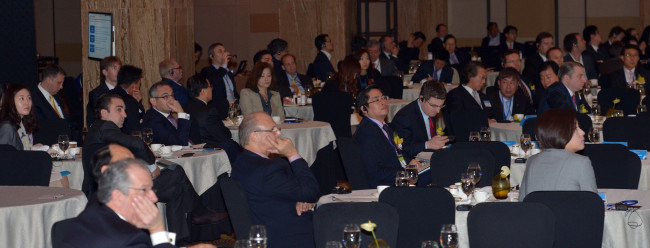Foreign businesses will receive equal opportunity and treatment under the government’s business policies, foreign business leaders heard from government officials on Thursday.
Government officials reassured that there would not be any “negative spillovers” to either the foreign business community or the general corporate sector from the incumbent administration’s plans to expose the underground economy, while pursuing fiscal balance and soundness.
 |
Participants from the foreign business community attend the Hear from the New Government forum at Millennium Seoul Hilton on Thursday. (Kim Myung-sub/The Korea Herald) |
“We still believe foreign investment is a part of the country’s growth engine,” said Choi Sang-mok, director of the Finance Ministry’s economic policy bureau, at the Herald Corp. conference for foreign businesspeople.
“The government will not hinder any businesses that operate within legal boundaries while it seeks to secure finances through (policies on) the underground economy.”
Its strengthened tax measures against the black market comes as the government aims to achieve fairness in taxation and the underground economy remains larger than other advanced economies.
The government urged the private sector, including the foreign investment community, to lead in boosting SMEs and start-ups in line with President Park Geun-hye’s vision for a creative economy.
The major difference between the incumbent government and the previous administration’s policy for start-ups is the former is trying to encourage the private sector to lead in creating venture firms and expanding their lifecycle, whereas previously this was mainly driven by the government.
The new government will put in place investment ecosystems through policy for private and foreign investors and start-up entrepreneurs.
The Finance Ministry reemphasized that the government would provide financial assistance worth some 180 trillion won ($160 billion) this year to both foreign and domestic SMEs through policy banks to support their growth.
Foreign businesspeople, meanwhile, urged the government to adopt a “flexible” labor policy in the country, with some saying it has one of the most rigid labor markets in the world.
They said Korea’s overly protective policy for workers could be a deterrent to further foreign investment, and foreign businesses want the flexibility to hire workers with exceptional skills while letting go of underperformers.
Employment and Labor Minister Ha-nam Phang said he was fully aware of this issue, and that the government will aim to make the labor market more flexible.
“We are aware that a rigid labor system can be an obstacle to job creation,” Phang said. “The government is striving to devise a (labor) policy that can give equal opportunity to all workers and promote shared growth at SMEs.”
Also, some said that it seemed the Korean government was going back to making the labor market “tight” as it seeks to boost employment and job security in line with its goal of achieving an employment rate of 70 percent.
Others noted inconsistent policies regarding foreign direct investment as the government seeks to promote FDI but at the same time was considering raising the minimum investment cap for foreign business registration and establishment in Korea.
Korea had considered increasing the cap to 300 million won from 100 million won.
“Foreign investors could be cautious toward investing in Korea if it is at 300 million won,” said Joseph J. Day, president of Market Entry Services, on the sidelines of the forum.
“However, policy inconsistencies tend to be very generic anywhere in the world,” said Day at the forum.
The Finance Ministry said that it planned to revise a law to relax gift tax levies on business or outsourced transactions between companies, invested by foreigners with more than a 50 percent stake ownership, and their subsidiaries or affiliates.
However, such a move is drawing attention as it would reversely discriminate against domestic companies.
The ministry plans to unveil its measures aimed at promoting FDI in June.
By Park Hyong-ki, Cho Chung-un and Chung Joo-won
(
hkp@heraldcorp.com), (chrisstory@heraldcorp.com), (joowonc@heraldcorp.com)








